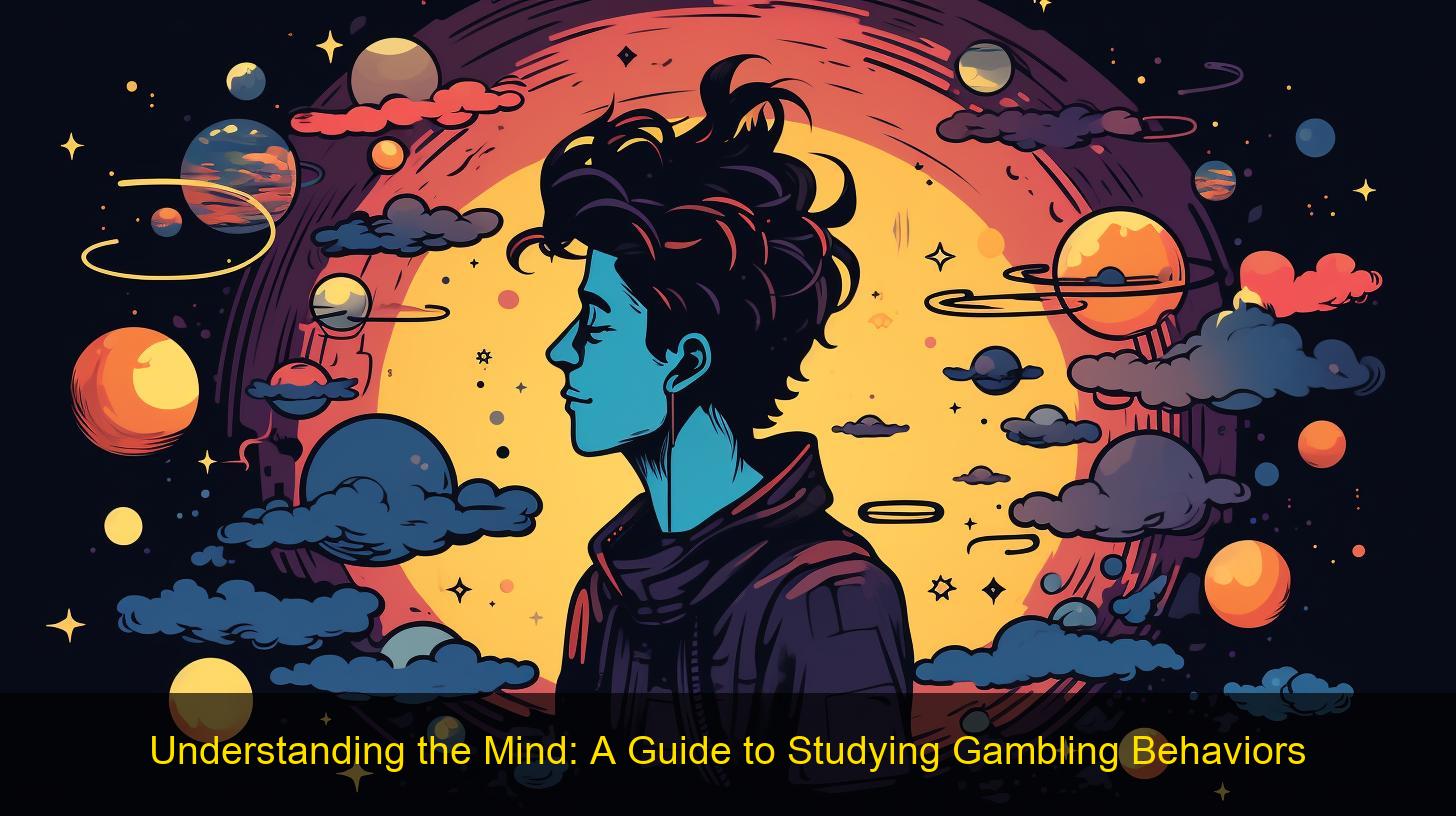When you think of Studying Gambling Behaviors, what comes to mind? Is it a group of friends around a poker table? Or perhaps you think of the solitary individual, laser-focused at the slot machine. Gambling, from a psychological standpoint, is a fascinating area to explore. It’s not just about luck or skill – a multitude of factors influence gambling behaviors.
Understanding the psychology behind gambling can provide unique insights into the human mind. It’s a field that combines elements from social psychology, behavioral economics, and cognitive neuroscience. From risk-taking tendencies to the role of superstitions, studying gambling behaviors can shed light on many aspects of human cognition and emotion.
- Risk-taking: This is a significant element in gambling. Why do some people seem to enjoy high-risk bets, while others play it safe? Studying gambling behaviors can help us understand the psychology of risk-taking.
- Superstitions: Many people have certain rituals or beliefs they adhere to when they gamble. What fuels these superstitions? Can they influence the outcome of the game, or is it all in the mind?
- Emotional Effects: Gambling can stir a wide range of emotions, from exhilaration to despair. Understanding how these emotions are triggered and managed is another key aspect of studying gambling behaviors.
Whether you’re a novice or a seasoned expert, diving into the world of gambling behaviors can be a rewarding and enlightening experience. Let’s embark on this journey together, shall we?
Understanding Gambling Behavior: A Psychological Perspective
Ever wondered why some people are hooked on gambling while others can play a round or two then walk away? Well, the world of psychology has some insights. Let’s delve into the science and psychology behind gambling behaviors, shall we?
The Science Behind Gambling Behaviors
The science behind gambling behaviors is truly fascinating. It’s all about the brain. You see, when you gamble, your brain’s reward system is stimulated, releasing a surge of dopamine – a ‘feel good’ neurotransmitter. This explains why many gamblers describe the experience as a thrilling ‘high’. But that’s not all. There’s also a thing called the “near-miss” effect. This phenomenon occurs when a gambler narrowly misses a win, which in turn triggers a rush of adrenaline that’s almost as powerful as winning itself. Intriguing, isn’t it?
Psychology’s Role in Studying Gambling Behaviors
Ever been curious about what role psychology plays in studying gambling behaviors? Well, psychology helps us understand the cognitive processes that underpin gambling behaviors. It allows us to dig deeper into factors which may predispose someone to gambling, such as personality traits, patterns of thinking, and emotional responses. By exploring these areas, psychologists can help develop effective strategies to prevent problem gambling and promote responsible gambling. Imagine if we could harness this knowledge to create a more responsible gambling environment. Wouldn’t that be phenomenal?
Interested in the subject? Learn more about it by studying Gambling Behaviors and Responsible Gambling Tools in a Simulated Online Casino.

Cognitive Distortions in Gambling
What if we told you that the way you perceive your decisions while gambling could be misleading? You might be a victim of cognitive distortions, such as the illusion of control and gambler’s fallacy. These are two common misbeliefs that can seriously hinder your decision-making process in the world of gambling.
Illusion of Control and Gambler’s Fallacy
Have you ever believed that you could somehow influence an unpredictable event? That’s what we call an illusion of control. It’s like believing you can influence the outcome of a coin toss because you’re the one flipping it. Similarly, the gambler’s fallacy is the belief that past events can affect future ones. Ever thought a roulette wheel is “due” to land on black because it landed on red the last few spins? That’s gambler’s fallacy, my friend.
Near Misses and Chasing Losses
Ever felt that adrenaline rush when you were just a hair’s breadth away from winning? This is known as a near miss. Many gamblers mistakenly take this as a sign that they’re getting closer to a win, leading them to continue playing. And then, there’s the relentless pursuit of recovering lost money, also known as chasing losses. It’s like trying to extinguish a fire by pouring gasoline on it. These distortions can make gambling addictive and destructive.
The Biological Factors of Gambling Behaviors
Studying gambling behaviors is a complex process that requires an understanding of various biological factors. Two of the pivotal elements are genetics and neuroscience.
Genetics and Gambling: The Role of Heredity
Research has shown that genetics can play a significant role in an individual’s propensity towards certain behaviors, including gambling. In fact, the genes we inherit from our parents may make us more susceptible to developing a gambling problem. This doesn’t mean that if your mother or father has a gambling disorder, you are guaranteed to develop one, but the chances are indeed higher.
Several studies have identified specific genes that appear to be associated with risk-taking behavior and impulse control, both of which are significant factors in gambling addiction. Further research in this area is necessary, but the initial findings provide significant insight into the hereditary aspect of studying gambling behaviors.
Neuroscience and Gambling: The Brain’s Reward System
On the other hand, neuroscience sheds light on the brain’s role in gambling behaviors. It’s been observed that the activities associated with gambling can stimulate the brain’s reward system, much like drugs or alcohol can.
- These reward pathways involve the release of dopamine, a neurotransmitter that generates feelings of pleasure and satisfaction. This response can lead to the desire to repeat the behavior, potentially leading to addiction.
- The excitement and anticipation associated with gambling can also cause a surge in adrenaline, another neurotransmitter that contributes to the “thrill” of gambling.
These biological factors serve as the foundation in studying gambling behaviors, providing us with a better understanding of why some individuals are more prone to gambling problems than others.

The Social and Environmental Influences on Gambling Behaviors
When it comes to studying gambling behaviors, it’s crucial to understand the impact of both social and environmental factors. These influences can play a significant role in encouraging or discouraging gambling behaviors, and their effect can vary greatly from individual to individual.
Social Factors That Encourage Gambling
There are a number of social factors that can contribute to the development and continuation of gambling behaviors. These include:
- Peer pressure: If an individual is surrounded by friends or family members who gamble regularly, they might feel encouraged or pressured to gamble as well.
- Societal acceptance: In societies where gambling is viewed as a harmless pastime or even a rewarding endeavor, individuals may be more likely to engage in gambling behaviors.
- Financial stress: Sometimes, people turn to gambling as a way to potentially solve financial difficulties, often spurred by societal pressures and expectations.
Environmental Triggers and Gambling
Environmental factors can also play a significant role in triggering gambling behaviors. This can include:
- Accessibility: The ease of access to gambling venues or online gambling platforms can significantly influence an individual’s tendency to gamble.
- Advertisement: Advertisements for gambling, particularly online and on television, can act as strong environmental triggers, often glamorizing the activity.
- Surroundings: Certain settings, such as casinos with their flashing lights, exciting sounds, and overall atmosphere, can act as powerful triggers for gambling behaviors.
In understanding the mind and studying gambling behaviors, recognizing these social and environmental influences can provide crucial insights into why people gamble and how these behaviors can be addressed.
Problem Gambling and Pathological Gambling
When studying gambling behaviors, a distinction is usually made between problem gambling and pathological gambling. Both are serious conditions that can have detrimental effects on individuals and their loved ones, but they differ in key ways.
Identifying Problem Gambling
Problem gambling, as the name suggests, occurs when gambling starts causing issues in someone’s life. It can manifest in various ways, such as:
- Spending more time and money on gambling than one can afford
- Feeling anxious or restless when not gambling
- Using gambling as a way of coping with problems or feeling better
Although problem gamblers may not have lost complete control over their gambling, their habits are causing significant stress and problems, and they often struggle to keep their gambling habits in check.
Understanding Pathological Gambling
Pathological gambling, also referred to as compulsive gambling, is a more severe form of problem gambling. It’s not just a bad habit or a moral weakness – it’s a serious condition recognized by medical professionals. Symptoms may include:
- Inability to stop or control gambling, even when faced with dire consequences
- Experiencing withdrawal symptoms when attempting to cut back on gambling
- Deterioration of personal and professional relationships due to gambling
Pathological gamblers are often consumed by their gambling habits, to the extent that it becomes the central focus of their lives. It’s a chronic condition that can lead to severe financial, social, and psychological repercussions if not treated properly.

Treatment and Intervention Strategies for Problem Gambling
Studying gambling behaviors helps us understand the intricacies of gambling addiction and more importantly, it enlightens us on efficient treatment and intervention strategies. When dealing with problem gambling, it’s crucial to have a well-rounded approach that addresses all aspects of the issue, ranging from individual psychological struggles to the influence of community and family.
Cognitive-Behavioral Therapy for Gambling Addiction
One of the most effective treatments for gambling addiction is Cognitive-Behavioral Therapy (CBT). This approach focuses on teaching individuals how to change their unhealthy gambling behaviors and thoughts. The idea is to replace negative habits with positive ones, thereby reducing the urge to gamble.
It’s important to note that CBT isn’t a one-size-fits-all solution. The therapy is tailored to the individual’s specific needs and may address issues such as impulse control, coping with urges, and managing stress and depression.
Community and Family Support: A Key in Recovery from Gambling Addiction
While professional help like CBT is vital, the role of community and family support in the recovery process cannot be overlooked. Family members can provide emotional support, help maintain a gamble-free environment, and encourage participation in alternative activities.
- Emotional Support: Emotional support from family and community members can go a long way in helping a person overcome gambling addiction. Knowing they have a support system can significantly reduce feelings of isolation.
- Maintaining a Gamble-Free Environment: Families can help by ensuring their home is a gamble-free zone. This includes removing gambling apps from devices and avoiding conversations about gambling.
- Encourage Alternative Activities: Engagement in hobbies, physical activities, or community events can serve as healthy distractions and reduce the desire to gamble.
Remember, studying gambling behaviors isn’t just about understanding the problem, it’s about finding ways to effectively treat and overcome the addiction.
FAQs
- Q: What is meant by ‘Studying Gambling Behaviors’?
A: ‘Studying Gambling Behaviors’ refers to the exploration and analysis of patterns and tendencies that influence an individual’s approach to gambling. This includes factors like risk-taking, decision-making and the psychological impacts of gambling. - Q: How does understanding the mind help in studying gambling behaviors?
A: By understanding how the mind works, particularly in relation to motivation, reward systems and impulse control, researchers can gain a clearer insight into why people gamble and how their behaviors can become problematic. - Q: What methods are used in studying gambling behaviors?
A: Researchers commonly use a combination of methods including surveys, personal interviews, focus groups, and observation. Technological methods such as brain imaging and neuropsychological tests can also be employed. - Q: Can studying gambling behaviors help problem gamblers?
A: Absolutely, by understanding the psychological triggers and cognitive distortions that lead to problem gambling, interventions can be designed to help problem gamblers regain control of their behaviors. - Q: Are there any psychological theories associated with gambling behaviors?
A: Yes, several theories have been postulated to explain gambling behaviors, including the Cognitive-Behavioral Theory, the Psychodynamic Theory, and the Addiction Theory, among others.
Conclusion
Wrapping up our dive into studying gambling behaviors, it’s clear that this is a multifaceted field, requiring a keen understanding of the human mind. By delving deeper into the psychological and social influences that drive these behaviors, we can develop more effective intervention strategies and support systems.
It’s important to remember that gambling, like many human behaviors, is a complex mix of biological, psychological, and social factors. One cannot be viewed in isolation from the others. By recognizing this, we can approach the study of gambling behaviors with the nuance and understanding it deserves.
- Biological factors: Some individuals may have a genetic predisposition to addictive behaviors, including gambling. Neurological imbalances can also play a role.
- Psychological factors: Mental health conditions, such as depression and anxiety, can often co-exist with problem gambling. Understanding these connections is crucial.
- Social factors: The influence of peers, family, and societal norms can heavily impact an individual’s gambling habits.
In the end, studying gambling behaviors is about more than just understanding why people gamble. It’s about developing a deeper insight into human nature and using this knowledge to help those who may be struggling. So, as you continue your journey studying gambling behaviors, remember to approach it with empathy, curiosity, and a commitment to understanding the complex world of the human mind.



